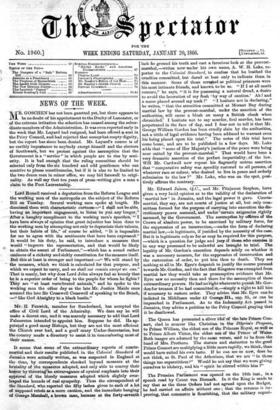Mr. Edward Jaines, Q.C., and Mr. Fitzjames Stephen, have given
a very lucid opinion as to the validity of the declaration of martial law' in Jamaica, and the legal power it gave. Courts- martial, they say, are not courts of justice at all, but only com- mittees formed for the purpose of carrying into execution the dis- cretionary power assumed, and under -certain exigencies rightly assumed, by the Government. The assumption by oaken of the Crown of absolute power, to be exercised by military force, for the suppression of an insurrection,—under the form of declaring martial law,—is legitimate, if justified by the necessity of the case. But it is legitimate only so far as may be required for this purpose, —which is a question for judge and jury if those who exercise it in any way presumed to be unlawful are brought to trial. The legality of Mr. Gordon's execution depends solely on whether it was a necessary measure, for the suppression of insurrection and the restoration of order, to put him thus to death. They see nothing at all in Mr. Eyre's despatch to justify the course pursued towards Mr. Gordon, and the fact that Kingston was exempted from martial law they would take as presumptive evidence that Mr. Eyre saw no necessity then and there for the assumption of these extraordinary powers. He had no right whatever to punish Mr. Gor- don for treason if he had committed it,—simply a right to kill him if necessary to restore order. They advise that Mr. Eyre can be indicted in Middlesex under 42 George III., cap. 85, or can be impeached in Parliament. As to the Indemnity Act passed in Jamaica, they advise a petition to the Privy Council praying that it be disallowed.






























